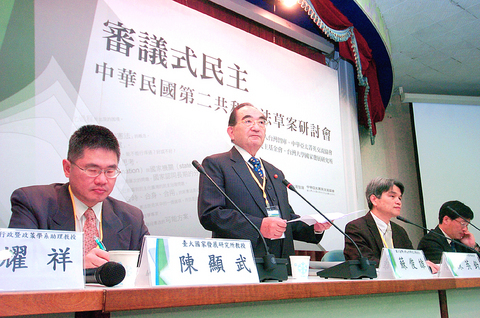The process of amending the Constitution should be made easier, a local think tank said yesterday, advocating a lowered legislative threshold as well as a public referendum on the issue.
The pro-independence Taiwan Thinktank yesterday published the second half of its draft "second republic" constitution, which covers the judicial system, powers of the central and local governments, fundamental national policies, welfare of Aborigines, constitutional amendments and implementation and transitional articles.
The draft was penned by Chen Ming-tong (

PHOTO: WANG MIN-WEI, TAIPEI TIMES
The project was inspired by former presidential adviser Koo Kwang-ming (辜寬敏), who has pushed for what he called a "second republic" constitution while leaving the document's details open to interpretation.
Koo's proposal elicited a response from President Chen Shui-bian (
Chen Ming-tong yesterday proposed procedures for constitutional revisions that would call upon direct democracy.
While constitutional amendments require the consent of three quarters of the legislators present and half the votes in a national referendum, the draft proposed to lower the legislative threshold to two thirds, pending a referendum.
The draft also proposed allowing the public to initiate constitutional amendments. At present, only legislators and the president can launch such revisions.
Clauses were also added to the draft to make a government transition from a semi-presidential system to a parliamentary system, as well as a five-branch government to a three-branch one, smoother.
If the "second republic" constitution were implemented next year, the draft would ban the next president from seeking a second term. Presidential powers would be highly reduced, but the term would be extended from four years to six years.
The premier appointed by the next president could hold on to the job until a new prime minister is chosen. The prime minister would be nominated by the president and would have to obtain the consent of half the legislators.
Chen In-chin, who wrote the chapter on the judicial system, proposed to establish a constitutional court to replace the Council of Grand Justices, which rules on the constitutionality of laws.
The draft states that half of the 15-member constitutional judges would be nominated by the prime minister every six years for a 12-year term. In order to appoint a nominee, two thirds of the legislators would have be present and two thirds of those present would have to approve the nomination.
To pass a ruling, two thirds of the judges would have to be present and half would have to agree.

The High Prosecutors’ Office yesterday withdrew an appeal against the acquittal of a former bank manager 22 years after his death, marking Taiwan’s first instance of prosecutors rendering posthumous justice to a wrongfully convicted defendant. Chu Ching-en (諸慶恩) — formerly a manager at the Taipei branch of BNP Paribas — was in 1999 accused by Weng Mao-chung (翁茂鍾), then-president of Chia Her Industrial Co, of forging a request for a fixed deposit of US$10 million by I-Hwa Industrial Co, a subsidiary of Chia Her, which was used as collateral. Chu was ruled not guilty in the first trial, but was found guilty

DEADLOCK: As the commission is unable to forum a quorum to review license renewal applications, the channel operators are not at fault and can air past their license date The National Communications Commission (NCC) yesterday said that the Public Television Service (PTS) and 36 other television and radio broadcasters could continue airing, despite the commission’s inability to meet a quorum to review their license renewal applications. The licenses of PTS and the other channels are set to expire between this month and June. The National Communications Commission Organization Act (國家通訊傳播委員會組織法) stipulates that the commission must meet the mandated quorum of four to hold a valid meeting. The seven-member commission currently has only three commissioners. “We have informed the channel operators of the progress we have made in reviewing their license renewal applications, and

‘DENIAL DEFENSE’: The US would increase its military presence with uncrewed ships, and submarines, while boosting defense in the Indo-Pacific, a Pete Hegseth memo said The US is reorienting its military strategy to focus primarily on deterring a potential Chinese invasion of Taiwan, a memo signed by US Secretary of Defense Pete Hegseth showed. The memo also called on Taiwan to increase its defense spending. The document, known as the “Interim National Defense Strategic Guidance,” was distributed this month and detailed the national defense plans of US President Donald Trump’s administration, an article in the Washington Post said on Saturday. It outlines how the US can prepare for a potential war with China and defend itself from threats in the “near abroad,” including Greenland and the Panama

Taiwan People’s Party (TPP) Chairman Huang Kuo-chang (黃國昌) yesterday appealed to the authorities to release former Taipei mayor Ko Wen-je (柯文哲) from pretrial detention amid conflicting reports about his health. The TPP at a news conference on Thursday said that Ko should be released to a hospital for treatment, adding that he has blood in his urine and had spells of pain and nausea followed by vomiting over the past three months. Hsieh Yen-yau (謝炎堯), a retired professor of internal medicine and Ko’s former teacher, said that Ko’s symptoms aligned with gallstones, kidney inflammation and potentially dangerous heart conditions. Ko, charged with